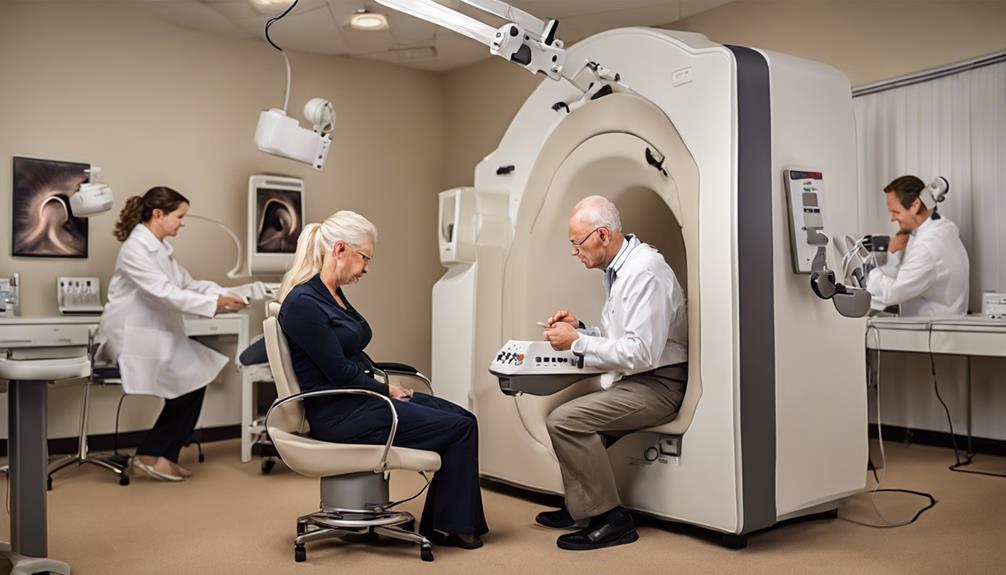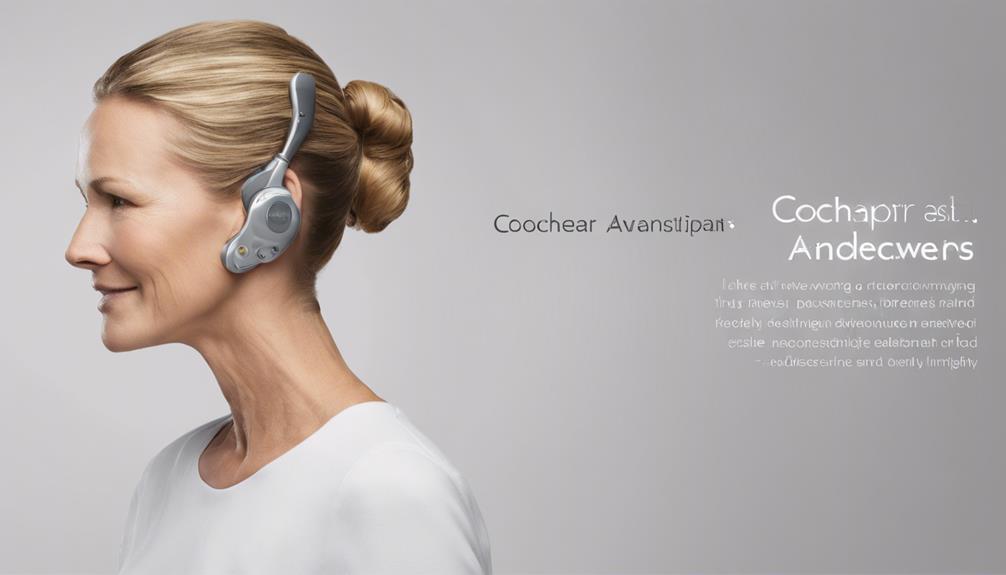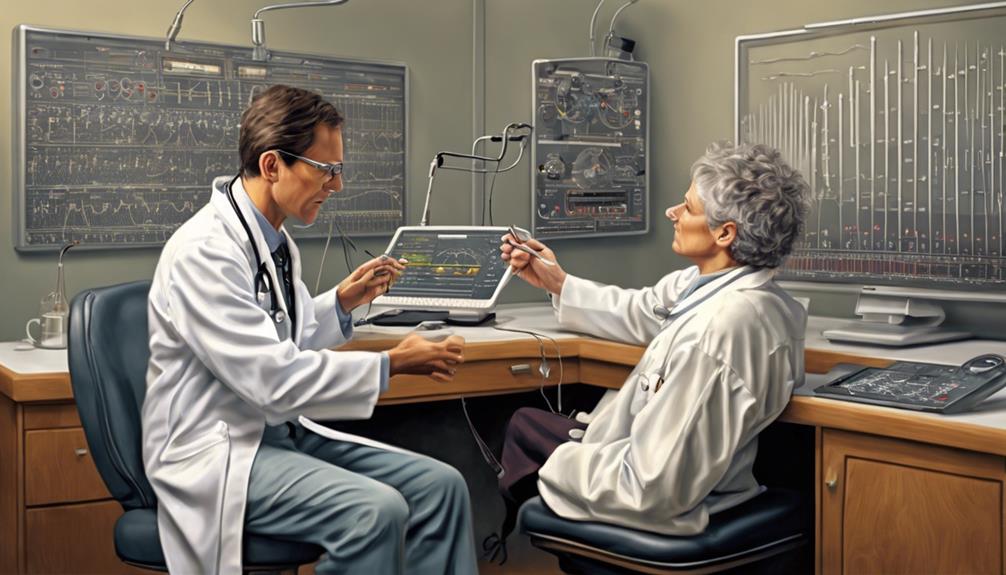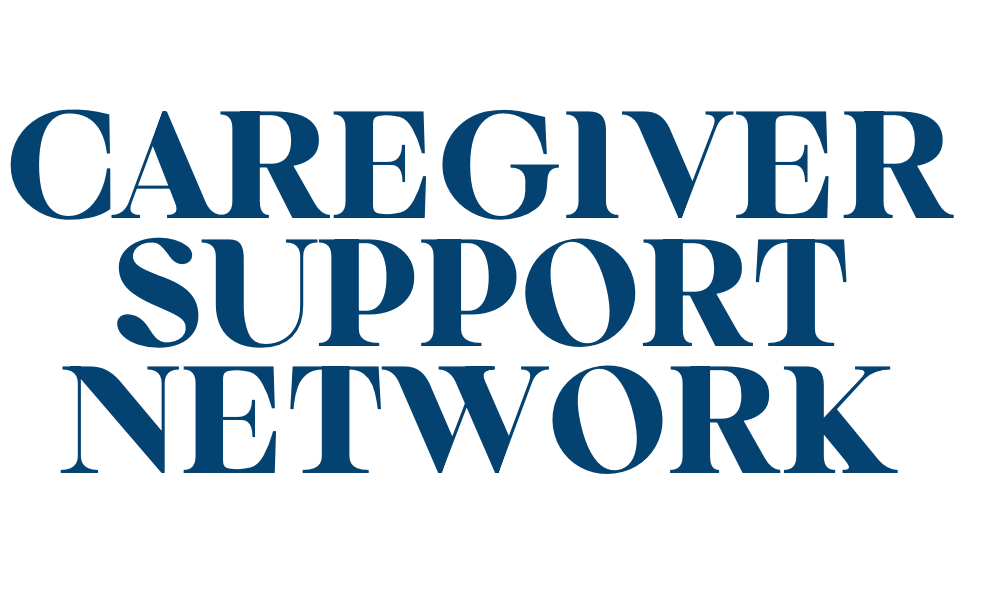Vision and Hearing Loss Support
Top 3 Hearing Aid Centers for Exceptional Service
Focusing on personalized solutions and support, Hearing Aid Centers offer more than just devices – discover how we can enhance your hearing experience.

At Hearing Aid Centers, we strive to provide precise and customized solutions for individuals facing hearing challenges. Backed by a team of skilled experts and state-of-the-art technology, our objective is to offer unparalleled assistance to those seeking improved hearing abilities.
But what sets us apart goes beyond just devices and diagnostics; we focus on fostering a supportive environment that prioritizes individual needs and preferences.
Let's explore how our centers can transform not just your hearing but your overall quality of life.
Key Takeaways
- Personalized care enhances communication and quality of life.
- Cutting-edge technology in hearing aids for improved listening.
- Family involvement for holistic support in hearing care.
- Comprehensive services cater to all ages for better well-being.
Importance of Hearing Aid Centers
At hearing aid centers, we offer personalized hearing care services tailored to address individual needs effectively, ensuring optimal communication and quality of life. Hearing health is a crucial aspect of overall well-being, and our focus on individual needs allows us to provide customized solutions for each person. By addressing hearing care at a personalized level, we can enhance not only the ability to hear but also the ability to actively engage in conversations and social interactions.
Our approach to hearing care goes beyond just fitting hearing aids; we prioritize understanding the unique requirements of each individual to create tailored treatment plans. This personalized care extends to the selection of hearing aid features such as noise reduction, feedback reduction, and speech enhancement, all aimed at optimizing communication experiences. Professional audiologists play a key role in ensuring that hearing aids aren't only comfortable but also function effectively, enhancing the quality of life for our clients. By focusing on individual needs, we can make a meaningful difference in promoting better hearing health and overall well-being.
Services Offered at Hearing Centers

Hearing centers provide a comprehensive range of services to address various aspects of hearing impairment, including prevention, evaluation, and rehabilitation. These centers offer thorough diagnostic testing to assess the patient's hearing abilities accurately. Professional audiologists, who are licensed and certified by reputable associations, conduct these tests and provide personalized hearing care solutions tailored to individual needs.
Hearing centers also specialize in the fitting of hearing aids, offering a wide array of features aimed at improving communication and comfort for the wearer. Patients visiting these centers can benefit from services such as online hearing screeners, partnership programs with hearing aid manufacturers for advanced technology options, and even telehealth services for convenient consultations.
Benefits of Visiting a Hearing Center
Exploring the advantages of seeking services at a hearing center reveals a myriad of benefits individuals can experience in addressing their hearing needs effectively.
At a hearing center, individuals with hearing loss can find relief and achieve better hearing through:
- Personalized Care: Licensed audiologists offer tailored solutions to address specific hearing impairments effectively.
- Comprehensive Services: These centers provide thorough diagnostic testing and a range of treatment options suitable for individuals of all ages, ensuring that each person receives the best possible care.
- Improved Quality of Life: Visiting a hearing center can lead to enhanced communication, stronger relationships, and an overall better quality of life for individuals experiencing hearing difficulties.
Latest Technology in Hearing Aids

Utilizing cutting-edge advancements, modern hearing aids now integrate innovative features that significantly enhance the auditory experience for individuals with hearing impairments. The latest technology in hearing aids includes noise reduction for clearer sound quality, feedback reduction for an improved listening experience, and speech enhancement features that enhance communication in various environments. Additionally, programmability and wireless capability options offer users convenience and flexibility in managing their hearing aids. One of the key advancements is the customized fit feature, ensuring that each hearing aid is tailored to fit the individual user perfectly, providing both comfort and effectiveness.
| Features | Benefits |
|---|---|
| Noise Reduction | Clearer sound quality |
| Feedback Reduction | Enhanced listening experience |
| Speech Enhancement | Improved communication in diverse settings |
| Programmability | Convenient adjustments |
| Wireless Capability | Flexible usage options |
Modern hearing aids available at our Hearing Center are equipped with this latest technology, offering a personalized and exceptional auditory experience.
Personalized Care at Hearing Centers
At hearing centers, our licensed audiologists provide personalized care tailored to meet individual hearing needs through comprehensive diagnostic testing and evidence-based practices. When you or your loved ones visit our center, we prioritize understanding your unique requirements and crafting solutions that cater specifically to you. Our commitment to personalized care is evident in the following ways:
- Individualized Treatment Plans: We create customized treatment plans based on your diagnostic results and personal preferences, ensuring that your hearing needs are addressed effectively.
- Family Involvement: We encourage the involvement of your loved ones in the care process, recognizing the essential role they play in your hearing health journey.
- Ongoing Support: Beyond the first visit, we offer continuous support and adjustments to guarantee that your hearing aids function optimally and provide the desired benefit to enhance your quality of life.
When you choose our hearing center, you can trust that you'll receive tailored care that considers your unique circumstances and preferences every step of the way.
Frequently Asked Questions
What Is the Average Cost of a Quality Hearing Aid?
The average cost of a quality hearing aid typically ranges from $1,000 to $4,000 per device. Factors like technology level, features, brand, and provider services influence prices.
Premium hearing aids with advanced features may cost over $6,000 each, while basic models can be found for $500 to $1,000.
Insurance coverage or financial assistance programs may help offset costs for eligible individuals.
Is It Better to Get a Hearing Aid From an Audiologist?
Absolutely, getting a hearing aid from an audiologist is highly recommended. Audiologists offer personalized care, expertise in evaluating hearing needs, and tailored solutions for optimal effectiveness. Studies show higher satisfaction levels and better outcomes when obtaining hearing aids through audiologists.
Their deep knowledge of the latest technology ensures patients are guided towards the most suitable options. Choosing an audiologist guarantees comprehensive evaluation, fitting, and ongoing support for improved hearing health outcomes.
What's the Number One Rated Hearing Aid?
The number one rated hearing aid is the Phonak Marvel, lauded for its exceptional sound quality and advanced technology. It offers features like direct streaming, rechargeability, and compatibility with smartphones for a seamless hearing experience. Users and professionals praise its clarity, connectivity, and adaptability to diverse listening environments.
Designed to provide a natural listening experience, it reduces background noise and enhances speech understanding. Phonak Marvel consistently ranks as a top choice for high-performance hearing aids.
Why Are Hearing Aid Prices so High?
Hearing aid prices are high due to the advanced technology and research that goes into developing them. Factors like custom fittings, warranties, follow-up care, and ongoing support services all contribute to the cost.
Research and development expenses, including clinical trials and testing, also impact pricing. Additionally, high-quality materials such as durable casing and advanced circuitry are used, raising the overall cost.
Professional services provided by audiologists, like evaluations, fittings, and adjustments, are included in the price.
Conclusion
In conclusion, hearing aid centers play a vital role in enhancing the quality of life for individuals with hearing loss.
By providing personalized care and the latest technology in hearing aids, these centers ensure a better communication experience for their patients.
Visiting a hearing center not only offers a range of services focused on preventing and rehabilitating hearing impairments but also promotes the importance of hearing health.
It's truly a one-stop solution for all hearing-related needs.
Albert brings a wealth of knowledge and expertise to our writing team. With a background in caregiving and a deep understanding of the challenges faced by caregivers, Albert’s writing resonates with authenticity and empathy. He is committed to delivering high-quality content that empowers and supports caregivers on their journey.
Vision and Hearing Loss Support
What Innovative Hearing Solutions Are Changing Lives?
Witness how innovative hearing solutions are revolutionizing lives, reshaping the way individuals interact with sound in extraordinary ways.

While it may be believed that hearing loss is a common part of aging, the reality is that cutting-edge hearing aids are revolutionizing lives in remarkable ways.
From cutting-edge hearing aid technology to revolutionary cochlear implant advancements, the field of audiology is experiencing groundbreaking developments that are improving the lives of individuals with hearing impairments.
By exploring the latest advancements in speech-to-text glasses innovation, crowd noise filtering app development, and regenerative drug therapy breakthroughs, we uncover a world where technology is not just assisting but truly transforming the way people interact with sound.
Key Takeaways
- Bluetooth connectivity and AI in hearing aids enhance personalization.
- Cochlear implants offer direct audio streaming and advanced features.
- Speech-to-text glasses provide real-time subtitles and transcription software.
- Regenerative drug therapy shows promise in restoring damaged cells for hearing loss.
Cutting-Edge Hearing Aid Technology
As we delve into the realm of Cutting-Edge Hearing Aid Technology, we're introduced to a world where innovative advancements revolutionize the way individuals experience sound and enhance their quality of life. The line between hearing aids and cutting-edge technology has blurred, offering solutions that not only aid in hearing loss but also help people stay connected and engaged in various activities. With Bluetooth connectivity, these aids allow for direct audio streaming from digital devices, ensuring seamless integration into daily life. Features like GPS tracking not only prevent loss but also enhance usability, providing a sense of security for users.
Moreover, the incorporation of AI in hearing aids enables personalized adjustments, leading to optimal performance tailored to individual needs. This not only improves sound quality but also ensures comfort and effectiveness. Additionally, advancements in battery life offer all-day usage on a single charge, promoting convenience and uninterrupted support for those with hearing difficulties. The integration of health monitoring capabilities further contributes to overall well-being by tracking physical activity and cognitive health. Innovative hearing solutions are truly transforming the way we perceive and interact with the world around us.
Revolutionary Cochlear Implants Advancements

With wireless connectivity enhancing communication capabilities, cochlear implants have undergone revolutionary advancements in improving sound quality and connectivity for users. These advancements haven't only transformed the way individuals with hearing loss experience sound but have also opened up new possibilities for improved communication and accessibility.
Here are some key points highlighting the latest developments in cochlear implants:
- Direct Audio Streaming: Cochlear implants now support direct audio streaming, allowing users to seamlessly connect to various audio sources without the need for additional accessories.
- Bluetooth Technology: The integration of Bluetooth technology in cochlear implants reduces interference and ensures clearer sound quality, enhancing the overall listening experience.
- Advanced Features: Modern cochlear implants come equipped with advanced features that cater to different listening environments, providing users with greater comfort and convenience.
- Improved User Experience: These advancements in sound quality and connectivity not only enhance the user experience but also promote better integration with digital devices, making daily activities more accessible and enjoyable.
Speech-to-Text Glasses Innovation
Our exploration into innovative hearing solutions continues with a remarkable development in the realm of auditory assistance – the groundbreaking Speech-to-Text Glasses Innovation. Smart glasses embedded with real-time speech-to-subtitles technology leverage augmented reality to display subtitles directly on the lenses, revolutionizing communication for individuals with hearing loss. Vuzix has already introduced smart glasses equipped with transcription software, a step towards enhancing accessibility and inclusivity. In the next few years, we anticipate the widespread availability of affordable eyewear featuring automatic captions, further bridging the gap in effective communication. This innovative speech-to-subtitles technology represents a significant advancement in communication enhancement, offering a practical solution to improve interactions for those with hearing impairments. By integrating cutting-edge features into everyday eyewear, these smart glasses are paving the way for a more inclusive and connected world.
| Key Points | Description |
|---|---|
| Real-time subtitles | Augmented reality technology displaying subtitles on smart glasses |
| Transcription software | Vuzix smart glasses incorporating software for individuals with hearing loss |
| Automatic captions | Future affordable eyewear expected to have automatic captioning features |
| Communication enhancement | Speech-to-subtitles technology providing innovative solutions for hearing loss |
Crowd Noise Filtering App Development

Developers are creating a Crowd Noise Filtering App to enhance the listening experience of individuals with hearing impairments by isolating speech in crowded environments using AI technology. This innovative app employs de-noising algorithms to improve conversation understanding in noisy settings. Anticipated advancements in powerful de-noising programs within hearing technology over the next five years signal a promising future for communication enhancement in challenging auditory environments. By focusing on technologies that prioritize speech clarity and comprehension for hearing-impaired individuals, this app aims to revolutionize how individuals with hearing loss experience and engage in conversations in noisy situations.
- App for isolating speech in crowded environments uses AI to enhance listening experience for hearing-impaired individuals.
- De-noising algorithms within the app improve conversation understanding in noisy settings.
- Anticipated availability of powerful de-noising programs in hearing technology within the next 5 years.
- Focus on developing technologies that enhance communication in challenging auditory environments.
Regenerative Drug Therapy Breakthroughs
Through regenerative drug therapy breakthroughs, researchers have successfully activated chemical switches to restore damaged cells responsible for hearing, offering hope for individuals affected by various forms of hearing impairments. The potential of regrowing cells that help in hearing holds promise for restoring hearing lost due to damaged hair cells, especially in conditions like age-related hearing loss. Inspired by natural hair cell regrowth in animals like birds and fish, scientists are now focusing on developing hair cell regrowth therapies for humans, with ongoing clinical trials for hereditary or acquired hearing loss. These innovative approaches aim to provide permanent solutions for various hearing impairments by addressing the root cause of cell damage. Below is a table summarizing key aspects of regenerative drug therapy in the context of hearing loss:
| Regenerative Drug Therapy for Hearing Loss | |
|---|---|
| Focus | Restoring damaged cells responsible for hearing |
| Applications | Age-related hearing loss, hereditary/acquired hearing loss |
| Progress | Clinical trials ongoing for hair cell regrowth therapies |
Frequently Asked Questions
What Is the New Technology to Restore Hearing?
We've seen remarkable advances in technology for restoring hearing. Gene therapy replaces mutated genes with healthy ones, regenerative medicine regrows damaged sensory cells in the inner ear, and artificial intelligence in personalized hearing aids enhances sound quality.
Cochlear implants with wireless connectivity improve communication, and ongoing human trials for hair cell regrowth therapies offer hope for the future. These cutting-edge solutions are revolutionizing the way we address hearing loss and transforming lives.
What Innovative Technology or Surgeries Are Helping Our Deaf Patients?
We see the impact of innovative hearing solutions daily. From gene therapy to cochlear implants with Bluetooth connectivity, the advancements in technology and surgeries are truly transforming the lives of our deaf patients.
These cutting-edge options offer hope and improved quality of life. Our team is dedicated to exploring and implementing these groundbreaking techniques to help our patients hear the world in a whole new way.
What Is the Modern Treatment for Hearing Loss?
When it comes to modern treatment for hearing loss, advancements in regenerative medicine, gene therapy, and cochlear implants are revolutionizing the field. Drug therapies are being developed to regrow hearing cells, while clinical trials for hair cell regeneration offer hope for age-related or genetic hearing loss.
Gene therapy shows promise in addressing hereditary hearing impairments.
Advanced cochlear implants with wireless connectivity are enhancing communication and daily activities for users.
What Is the New Technology for the Deaf?
When it comes to new technology for the deaf, advancements are truly remarkable. From speech-to-subtitles in real-time to transcription software on smart glasses, the innovations are changing lives.
Imagine the possibilities of AI isolating speech in noisy environments for better listening experiences. With affordable eyewear featuring automatic captions on the horizon and powerful de-noising programs expected soon, the future looks bright for those with hearing challenges.
Conclusion
In this ever-evolving landscape of hearing solutions, we're witnessing a symphony of innovation harmonizing to create a crescendo of life-changing possibilities.
From cutting-edge hearing aids to revolutionary cochlear implants, the melody of advancements is bringing clarity and hope to those with hearing impairments.
With each breakthrough, we're composing a new era of sound, where individuals can once again experience the world in all its rich and vibrant tones.
Albert brings a wealth of knowledge and expertise to our writing team. With a background in caregiving and a deep understanding of the challenges faced by caregivers, Albert’s writing resonates with authenticity and empathy. He is committed to delivering high-quality content that empowers and supports caregivers on their journey.
Vision and Hearing Loss Support
Tell If Hearing Loss Is Permanent or Temporary: 5 Key Differences
Wondering how to distinguish between permanent and temporary hearing loss? Find out the key signs and factors that can help you determine the difference.

A friend recently told me that they experienced sudden hearing loss after attending a loud music event. This got me thinking: how can you tell the difference between temporary and permanent hearing damage?
Understanding the nuances between these two types is essential, as it can impact the necessary steps for treatment and management. As we explore the signs and factors that differentiate temporary from permanent hearing loss, we aim to provide insights that could potentially help individuals navigate this aspect of their health more effectively.
Key Takeaways
- Differentiate between sensorineural and conductive causes for permanent or temporary hearing loss.
- Immediate evaluation is crucial for sudden hearing loss to determine permanency.
- Monitoring symptoms and audiometric tests help distinguish temporary from permanent hearing loss.
- Consult an audiologist for accurate diagnosis and tailored interventions for hearing loss.
Types of Hearing Loss
Exploring the various types of hearing loss provides crucial insights into the diverse mechanisms and conditions that can impact an individual's auditory function.
Sensorineural hearing loss involves damage to the nerves and hair cells responsible for transmitting signals from the inner ear to the brain, leading to difficulties in processing sound.
On the other hand, conductive hearing loss can occur due to obstructions such as ear infections, earwax buildup, or foreign objects in the ear canal, which hinder the conduction of sound waves.
Mixed hearing loss combines aspects of both sensorineural and conductive hearing loss, posing challenges in treatment planning.
Central hearing loss, affecting the central auditory nervous system, disrupts the brain's ability to interpret sound signals correctly.
Sudden hearing loss, characterized by a rapid decline in auditory function, necessitates immediate evaluation and intervention to prevent long-term complications.
Understanding these distinct types of hearing loss is essential in determining appropriate management strategies and providing effective support for individuals experiencing varying degrees of hearing impairment.
Causes of Temporary Hearing Loss

Temporary hearing loss can result from various causes such as ear infections, medications, allergies, loud noise trauma, and obstructions. When individuals experience temporary hearing loss, they may notice symptoms like muffled sounds, difficulty hearing high-pitched noises, balance issues, and tinnitus. This type of hearing loss can occur suddenly or develop over a short period, affecting people of all ages.
To determine the severity and type of temporary hearing loss, evaluation tests such as pure tone audiometry, tuning fork tests, and auditory brain stem response tests are commonly utilized.
The good news is that with appropriate treatment, temporary hearing loss can often be resolved. By addressing the underlying cause, whether it be treating an ear infection, adjusting medications, protecting the ears from loud noises, or removing obstructions, individuals can regain their normal hearing function. Seeking timely evaluation and intervention is crucial in managing temporary hearing loss effectively and preventing it from becoming permanent.
Causes of Permanent Hearing Loss
Permanent hearing loss can be caused by a variety of factors, including prolonged exposure to loud noise, age-related changes in the inner ear, certain health conditions, ototoxic medications, and gradual processes that necessitate early identification for appropriate management.
Prolonged exposure to loud noises can damage the delicate hair cells in the inner ear, leading to irreversible hearing loss. Age-related hearing loss, known as presbycusis, is a common cause of permanent hearing impairment due to natural changes in the inner ear over time. Additionally, certain health conditions such as genetic disorders, autoimmune diseases, Meniere's disease, viral infections, and head trauma can result in permanent hearing loss.
Furthermore, medications with ototoxic effects can contribute to irreversible damage to the hearing mechanism, leading to permanent hearing impairment. Recognizing the signs of these conditions early on is crucial for effective management and intervention to mitigate the progression of permanent hearing loss.
Distinguishing Permanent From Temporary Loss

When differentiating between hearing loss types, understanding the distinction between temporary and permanent conditions is crucial for effective management and intervention. Permanent hearing loss is typically irreversible, necessitating long-term treatment or management strategies.
Conversely, temporary hearing loss may resolve spontaneously or with appropriate treatment, such as addressing underlying causes like ear infections or earwax buildup. Audiological tests play a vital role in determining the type and severity of hearing loss, aiding in the differentiation between temporary and permanent conditions.
Monitoring the duration and progression of hearing loss symptoms can offer valuable insights into whether the loss is temporary or permanent. Seeking prompt evaluation by a healthcare professional is essential as it can lead to an accurate diagnosis and appropriate intervention for either temporary or permanent hearing loss.
Preventing and Treating Hearing Loss
Utilizing protective ear gear in noisy environments can significantly lower the risk of enduring hearing loss. Hearing loss can occur due to various factors, including exposure to loud noises and certain medical conditions. To address hearing loss effectively, it's crucial to take the best course of action promptly.
Here are four essential steps to prevent and treat hearing loss:
- Wear Ear Protection: Invest in quality earplugs or earmuffs to safeguard your hearing in loud settings, such as concerts or construction sites. Prioritizing ear protection can help prevent potential damage to your hearing.
- Seek Immediate Medical Attention: If you experience sudden hearing loss or notice a decline in your hearing abilities, see a doctor right away. Prompt evaluation can determine the causes of temporary hearing issues and guide appropriate treatment.
- Consult an Audiologist: Professional evaluation by an audiologist can accurately diagnose the nature of your hearing loss—whether it's permanent or temporary. They can recommend suitable interventions, such as hearing aids or cochlear implants, tailored to your specific needs.
- Follow Up Regularly: After initiating treatment, maintain regular follow-up appointments to monitor your hearing health. Tracking any changes in your hearing function can help manage hearing loss effectively and adjust interventions as needed.
Frequently Asked Questions
How Long Does It Take for Temporary Hearing Loss to Go Away?
Temporary hearing loss typically resolves in a few hours to a few days, depending on the underlying cause. Seeking prompt medical attention and treatment can help speed up the recovery process.
Monitoring symptoms and consulting a healthcare professional can provide a clearer timeline for the duration of temporary hearing loss. Remember, early intervention is key to addressing temporary hearing loss effectively.
What Is the Difference Between Permanent and Temporary Hearing Loss?
When it comes to hearing loss, understanding the difference between permanent and temporary conditions is crucial. Permanent hearing loss is irreversible and often requires ongoing management, like hearing aids.
Temporary hearing loss, on the other hand, can be resolved with appropriate treatment. Differentiating between the two involves assessing underlying causes and conducting diagnostic tests.
Timely intervention and professional evaluation play a key role in determining the nature of the hearing loss and implementing effective treatment strategies.
Can Hearing Loss Go Away on Its Own?
Absolutely, hearing loss can indeed go away on its own, depending on the underlying cause. Factors like ear infections, earwax buildup, or certain medications can trigger temporary hearing issues that may resolve spontaneously.
It's crucial to monitor symptoms closely and seek professional evaluation to determine the nature of the hearing loss. Quick action and proper care can make all the difference in whether our hearing loss is fleeting or lasting.
How Do You Regain Temporary Hearing Loss?
We can regain temporary hearing loss through various methods, including seeking medical evaluation for proper diagnosis and treatment. Depending on the cause, treatment options like medication for infections, earwax removal, or noise reduction strategies can aid in recovery.
Monitoring symptoms and prompt medical attention are crucial in regaining temporary hearing loss effectively and preventing complications. Professional guidance from an audiologist or ENT specialist can provide tailored solutions for individual cases of temporary hearing loss.
Conclusion
In conclusion, whether our hearing loss is temporary or permanent, seeking help from professionals is key. By understanding the causes, distinguishing between the types, and taking preventative measures, we can better manage our hearing health.
Remember, our ears are precious and deserve the best care possible. Let's listen closely to our bodies and take action when needed to ensure a sound future ahead.
Albert brings a wealth of knowledge and expertise to our writing team. With a background in caregiving and a deep understanding of the challenges faced by caregivers, Albert’s writing resonates with authenticity and empathy. He is committed to delivering high-quality content that empowers and supports caregivers on their journey.
Vision and Hearing Loss Support
Unveiling What Heartland Hearing Center Does Offer in Services
Marvel at the unique blend of cutting-edge technology and personalized care Heartland Hearing Center offers for your hearing needs – but that's just the beginning.

At Heartland Hearing Center, we provide a unique blend of cutting-edge technology and personalized care to address a range of hearing needs.
From tailored diagnostics and customized hearing solutions to comprehensive exams and advanced technology options, our range of services aims to enhance your hearing experience.
But that's just the beginning – our commitment to improving your quality of life extends beyond traditional offerings.
Would you like to discover more about how we can help you hear better and live better?
Key Takeaways
- Comprehensive hearing evaluations tailored to individual needs
- Customized hearing aid fittings for optimal comfort and performance
- Efficient repairs and maintenance services using genuine parts
- Specialized tinnitus management solutions for improved quality of life
Hearing Evaluations and Tests
At Heartland Hearing Center, we conduct comprehensive hearing evaluations and tests to assess your auditory health and tailor personalized solutions for optimal hearing. Our professional team emphasizes the importance of regular hearing exams for overall health. We offer individualized diagnostics based on various auditory tests, including the Pure Tone Air Test, Bone Conduction, and Speech Test. These tests help us determine your hearing levels accurately and design appropriate interventions.
With a focus on improving speech understanding, our rehabilitation protocols are designed to cater to your specific needs. As part of our commitment to your well-being, we provide a Baseline Hearing Test as a complimentary service for medical evidence. Since 1989, our experienced professionals have been delivering high-quality services, ensuring that you receive the best care possible.
Our range of diagnostic tests allows us to assess different levels of hearing loss effectively, enabling us to provide tailored solutions that suit your unique requirements. Your hearing health is our priority, and we're dedicated to helping you achieve optimal auditory well-being.
Customized Hearing Aid Fittings

Our commitment to personalized auditory care extends to providing tailored hearing aid fittings at Heartland Hearing Center. Our highly trained professionals conduct customized fittings based on individual needs and specific lifestyle requirements. By taking into account each person's unique preferences, we ensure optimal comfort and performance of the personalized hearing aids. Utilizing advanced technology, we offer the best possible solutions to improve our clients' quality of life through enhanced hearing.
At Heartland Hearing Centers, our focus on customized fittings goes beyond the initial appointment. We provide follow-up care to address any changes in hearing needs and to guarantee ongoing satisfaction with the fittings. This commitment to personalized care ensures that our clients receive the support they need throughout their hearing aid journey.
Trust Heartland Hearing Center for expertly crafted, personalized hearing aid fittings that cater to your individual requirements and preferences.
Hearing Aid Repairs and Maintenance
Providing comprehensive services for hearing aid repairs and maintenance is a priority at Heartland Hearing Center. Our skilled professionals specialize in offering maintenance services that aim to extend the lifespan of hearing aids. From minor adjustments to addressing complex issues, our team efficiently handles various types of repairs to ensure optimal performance.
We understand the importance of quick turnaround times for repairs, minimizing downtime for individuals dependent on their hearing aids.
At Heartland Hearing Center, we use genuine parts and rely on expert technicians to deliver high-quality repairs and maintenance services. This commitment to quality ensures that your hearing aids are in the best possible condition. Whether it's a minor repair or routine maintenance, you can trust our team to provide the necessary expertise and care.
For all your hearing aid repair and maintenance needs, rely on Heartland Hearing Center for professional service you can count on.
Tinnitus Management Solutions

With a focus on personalized care and specialized techniques, Heartland Hearing Center offers effective tinnitus management solutions for individuals experiencing ringing or buzzing in the ears. Our approach to tinnitus management is centered around improving the quality of life for those affected by this condition.
Here are some key aspects of our tinnitus management services:
- Tailored Programs: We provide specialized programs and techniques designed to manage and reduce the impact of tinnitus on daily life.
- Personalized Plans: Our experienced professionals create personalized tinnitus management plans based on the individual's unique needs and the severity of their symptoms.
- Professional Support: We offer professional support, counseling, and various treatment options to alleviate tinnitus-related distress and discomfort.
- Quality of Life Improvement: Through comprehensive evaluations and ongoing care, we aim to enhance the quality of life for individuals struggling with tinnitus.
- Individualized Care: We understand the challenges tinnitus can bring and strive to deliver individualized care to address each person's specific concerns related to hearing loss and tinnitus.
Our tinnitus management solutions are designed to provide relief and support for those dealing with this condition.
Hearing Protection Services
At Heartland Hearing Centers, our specialized hearing protection services are tailored to prevent damage from loud noises and cater to individual needs and lifestyles. We understand the importance of preserving your hearing health, which is why we offer customized solutions to protect against noise-induced hearing loss.
Our services include fitting for custom earplugs and earmolds, ensuring a perfect and comfortable fit for optimal protection. Whether you're regularly exposed to loud environments at work, concerts, or sporting events, or simply looking to safeguard your ears in daily activities, our hearing specialists are here to help.
We take the time to educate our clients on the significance of hearing protection and empower them to make informed decisions for their well-being. By addressing your specific requirements and considering your lifestyle, we can recommend the most suitable hearing protection options for you.
Don't compromise on your hearing health – let Heartland Hearing Centers provide the personalized hearing protection services you need.
Frequently Asked Questions
What Are Programs on My Hearing Aid?
When looking at programs on your hearing aid, it's crucial to understand how they can enhance your hearing experience. These programs are customized to suit your lifestyle and improve speech clarity in various situations.
At Heartland Hearing Center, our dedicated team assists in selecting the best program for your needs. With access to cutting-edge technology in hearing aids, we provide personalized solutions that deliver optimal results for our clients.
Is Hearing Aid Free?
We understand the concern about the cost of hearing aids. At Heartland Hearing Center, we offer free Baseline Hearing Tests and initial consultations to assess your needs.
While hearing aids typically have a cost, our team will work with you to find the best solutions within your budget. We prioritize your hearing health and strive to make quality care accessible to all.
Let's schedule a consultation to explore your options further.
What Deals With Hearing?
When it comes to what deals with hearing, there are various services available to address hearing issues. From hearing tests to evaluations, and even tinnitus management, we offer a range of solutions to support your hearing health.
Our Signia hearing aids and accessories provide personalized options for those experiencing hearing loss. Additionally, we provide repair and maintenance services to ensure your hearing aids function optimally.
Trust us to care for your hearing needs.
Conclusion
In conclusion, Heartland Hearing Center offers a wide range of services to address individual hearing needs, from comprehensive evaluations and personalized fittings to maintenance and tinnitus management.
With a focus on advanced technology and personalized care, we strive to improve the quality of life for those with hearing loss.
At the end of the day, we aim to go the extra mile to ensure our patients are hearing crystal clear, like a breath of fresh air on a sunny day.
Albert brings a wealth of knowledge and expertise to our writing team. With a background in caregiving and a deep understanding of the challenges faced by caregivers, Albert’s writing resonates with authenticity and empathy. He is committed to delivering high-quality content that empowers and supports caregivers on their journey.
-

 Dementia Care2 months ago
Dementia Care2 months agoUnderstanding the Stages of Vascular Dementia: A Visual Chart Guide
-

 Dementia Care3 months ago
Dementia Care3 months ago10 Engaging Dementia Games for Cognitive Stimulation
-

 Dementia Care3 months ago
Dementia Care3 months agoHow Gabapentin Affects Dementia: A Comprehensive Guide
-

 Dementia Care3 months ago
Dementia Care3 months ago5 Things You Need to Know About Jack Nicholson’s Dementia
-

 Dementia Care1 month ago
Dementia Care1 month agoUnderstanding Narcissism and Dementia: A How-To Guide
-

 Dementia Care1 month ago
Dementia Care1 month agoHow to Deal with a Parent’s Dementia: A Practical Guide
-

 Dementia Care1 month ago
Dementia Care1 month agoDavid Suchet’s Wife Opens Up About Living with Dementia
-

 Dementia Care1 month ago
Dementia Care1 month agoUnderstanding the Link Between Ambien and Dementia: A How-To Guide



















